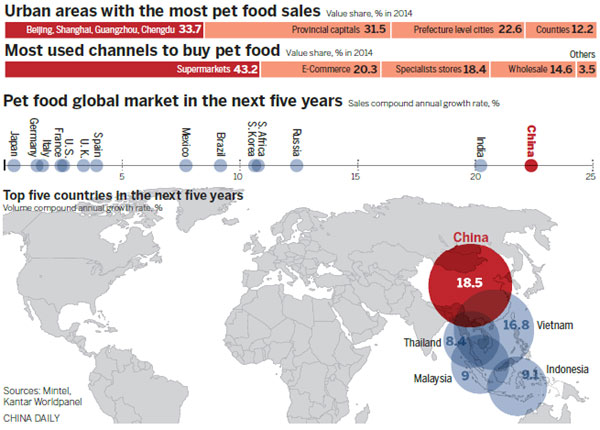Spreading the message on pet nutrition
By Wang Zhuoqiong (China Daily) Updated: 2015-03-20 07:14
 |
After 10 years of working at Wrigley, Mars' chewing gum brand, Su wanted to pursue new challenges. "Petcare was a good fit," he said explaining his decision to enter the industry.
Working in the pet care sector requires a more in-depth understanding of consumers, the pet owners who buy the products and the pets who consume them, he said. "Petcare is built on love and trust, and we take our job seriously," said Su.
To further its roots, the company set up the Mars Petcare Academy in China in 2012. It is aimed at sharing the concept of pet nutrition among Chinese consumers.
Su said that Mars Petcare Academy has been gaining in popularity and received about 10 million page views after it went online in 2013. The site also had unique visits of more than 6 million, which means more than 6 million consumers have gained professional knowledge.
New media and technology have also enabled Mars to engage and interact with Chinese pet owners and imbibe scientific knowledge on pet feeding and caring so as to boost pet food conversion.
The company also has an official WeChat account to offer online and offline content and activities along with easy-to-understand pet nutrition and care knowledge. "We are still on a journey. And we have to work with our peers to do the right thing," he said.
As a working father, Su tries to manage his time well so that he has enough time to spend with his twin children and family in Beijing.
"At home, I am a part of a team of five. I live with my wife, my mother-in-law and my two sons, Harry and William," he said.
"My twins are curious and love to learn. I always feel a sense of pride when I spend time with them," he said. "Harry likes reading, he always asks me to read for him, while William likes geometric shapes and enjoys pushing buttons on appliances and in elevators."
Understanding feeding habits crucial for animals' health
Overeating is responsible for most of the ailments in dogs, said Lin Degui, head of the pet clinic affiliated with the China Agriculture University.
According to statistics gleaned from Lin's outpatient services, about 60 percent of dog owners in China feed their dogs twice a day whereas an adult dog requires only one meal a day.
Most of the dog owners in China also mix pet food with Chinese food to improve the taste. This tends to make the pets overeat, while the excess nutrition could cause problems to the pet's metabolism, including, obesity, high cholesterol and diabetes. What is even more alarming is that pet owners are often reluctant to take preventive measures during feeding and are only willing to listen when their pets become sick.
To enhance the awareness of scientific feeding and to provide wholesome nutrition for pets, it is important to introduce more nutrition courses among veterinary students in colleges and to offer more interactive and easy-to-understand information for pet owners, he said.
- High-tech companies a growing force in Beijing real estate market
- Beer sales suffer due to cool weather
- China boosts world economy via investment, capacity cooperation
- China stocks close lower on Friday
- Investors' antics at stock market slump
- Stock indexes decline on selling pressure
- Virtual reality sector gearing up for the long haul
- Xbox chief sees 'long-term' future in China

















